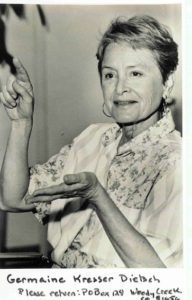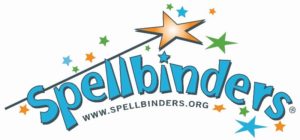Our Purpose
Through the art of oral storytelling, Spellbinders® enhances literacy, encourages character development, and builds intergenerational community.
A message to Spellbinders from the Founder at Annual meeting 2019
(NOTE: You may want to be ready to adjust your audio down – the volume goes up at 3:38; Also, the “subscribe” button toward the end refers the the producer’s youtube channel and can be ignored.)
Our History
 In the early 1980s Spellbinders’ founder Germaine Dietsch became alarmed at the growing disconnect between the generations as more and more older adults moved into retirement communities. She feared this trend would deprive elders of the sense of meaning and purpose important to their physical and emotional health, and deprive youngsters of the sources of wisdom and talent her own relatives and neighbors had provided.
In the early 1980s Spellbinders’ founder Germaine Dietsch became alarmed at the growing disconnect between the generations as more and more older adults moved into retirement communities. She feared this trend would deprive elders of the sense of meaning and purpose important to their physical and emotional health, and deprive youngsters of the sources of wisdom and talent her own relatives and neighbors had provided.
At age 51, Germaine earned a Masters Degree in Theater Arts and a certificate in Gerontology with the intention of finding ways to encourage older adults to remain creatively engaged in their communities.
In 1988 Germaine developed a pilot intergenerational program with Denver Public Schools. She recruited a group of seniors to be trained in the art of storytelling by professional storytellers and to then tell stories in elementary school classrooms. The program was an immediate success; the seniors loved their connection to children and the children loved the seniors and their stories.
In 1990, the Volunteer Services Office of Denver Public Schools began sponsoring workshops to train more volunteers to tell stories in more schools. Soon there were 20 storytelling volunteers who dubbed themselves “Spellbinders” due to story’s ability to keep children spellbound. In 1991 the program received a Colorado Association of Partners in Education award.
In 1997, Spellbinders became a Colorado non-profit corporation with the goal of establishing Spellbinders volunteer storytelling “chapters” around the country. The national office offered the materials, methods and sometimes seed funding necessary to start a Spellbinders “chapter”, and those “chapters” recruited, trained, and placed volunteer storytellers in local school classrooms and other venues that they had identified.
In 2020 Spellbinders National worked with many former chapters to help them become independent organizations. Currently, 14 local organizations across three states have qualified as Spellbinders’ Licensed Local Storyteller Organizations (LLSOs). Spellbinders National continues to support these local storytelling groups by certifying Spellbinders Trainers, providing the accredited training materials and guidelines, and maintaining the Spellbinders website and a communication network that provides peer support and guidance.
